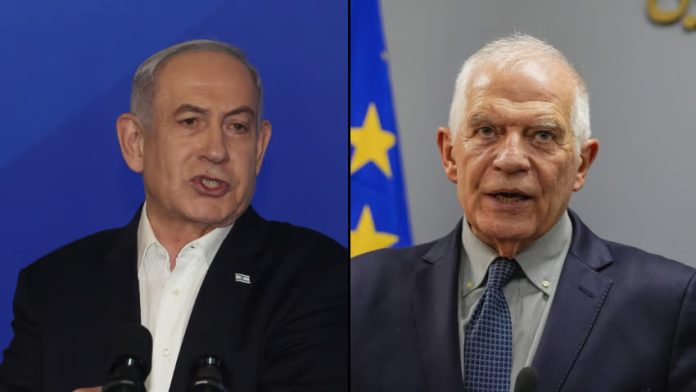The situation in Gaza turned “incommensurable,” EU foreign policy chief Josep Borrell declared, while Israeli Prime Minister Benjamin Netanyahu stated that he was ready to accept only a “partial” ceasefire agreement.
Josep Borrell, speaking on the doorstep of the EU Foreign Affairs Council meeting in Brussels, deplored the deaths of more than 100 Palestinians in the latest Israeli attacks over the weekend, which he described as “one of the bloodiest days.”
But we will continue supporting this kind of ideas, because we need desperately a cease-fire that could allow humanitarian help to enter into Gaza, otherwise, the tragedy will be incommensurable. Well, it is already incommensurable.
Borrell also explained the risk of escalation in Lebanon. Israel and Hezbollah have been engaged in border fighting since the beginning of the Gaza conflict, with tensions recently escalating to the point where both sides have claimed they are ready to go to war.
Belgian Foreign Minister Hadja Lahbib, for her part, stated that the EU should take all measures to force the sides to stop fighting.
We absolutely must progress on a peace process, and on talks that must lead to the implementation of the two-state solution.
Meanwhile, German Foreign Minister Annalena Baerbock on Monday called for an immediate ceasefire in Gaza. She also warned that further escalation in the Middle East would be a “catastrophe” for everyone in the region. Baerbock announced that she would travel to Israel to discuss diplomatic efforts to bring about a ceasefire in Gaza and ways to increase humanitarian aid to the Palestinians.
We’re thinking of the hostages, the images from Gaza, they are heartbreaking. That’s why it’s definitely not an option for us, and our partners, to bury our heads in the sand now, we need this ceasefire.
Baerbock called on the Palestinian group Hamas to release all Israeli prisoners and accept a ceasefire proposal backed by US President Joe Biden last month. She emphasised that a ceasefire in Gaza was “more urgently needed than ever before” amid rising tensions between Israel and Hezbollah.
I will be travelling to the region again, I will also be visiting Lebanon, because the situation on the Blue Line in the north of Israel is more than worrying, a further escalation would be a catastrophe for all people in the region. That is why it is so important that we finally achieve the ceasefire in Gaza.
Netanyahu’s response
In an interview broadcast late Sunday night on Israel’s Channel 14, Netanyahu said he was “prepared to make a partial deal – this is no secret – that will return to us some of the people.”
But we are committed to continuing the war after a pause, in order to complete the goal of eliminating Hamas. I’m not willing to give up on that.
The three-phase plan would lead to the release of the remaining hostages in exchange for hundreds of Palestinians imprisoned by Israel. But disputes and mistrust remain between Israel and Hamas over how the deal will end.
Hamas insists it will not release the remaining hostages until there is a permanent ceasefire and a full Israeli withdrawal from the Gaza Strip. When Biden announced the latest offer last month, he said it included both conditions.
Netanyahu told the interview that the current phase of fighting was coming to an end, but that did not mean the war was over.
Hamas, meanwhile, seems concerned that Israel will resume the war as soon as its most vulnerable hostages are returned. And even if that doesn’t happen, at this point in the negotiations Israel could make demands that were not part of the original deal and are unacceptable to Hamas, and then resume the war when Hamas refuses to accept them.
Netanyahu’s remarks reinforced these concerns. After they were aired, Hamas said they represented “unmistakable confirmation of its rejection” of the US-backed agreement, which also received support from the UN Security Council.
US Secretary of State Antony Blinken said during a visit to the region earlier this month that some of Hamas’ demands were “workable” and some were not, without going into detail.
A group representing Halachnik families condemned Netanyahu’s remarks, which they saw as a rejection of Israel’s latest ceasefire offer.
More than 37,000 Palestinians have been killed in Israel’s retaliatory war in Hamas-controlled territory, according to the health ministry. It has triggered a humanitarian crisis and displaced most of the territory’s 2.3 million people.
